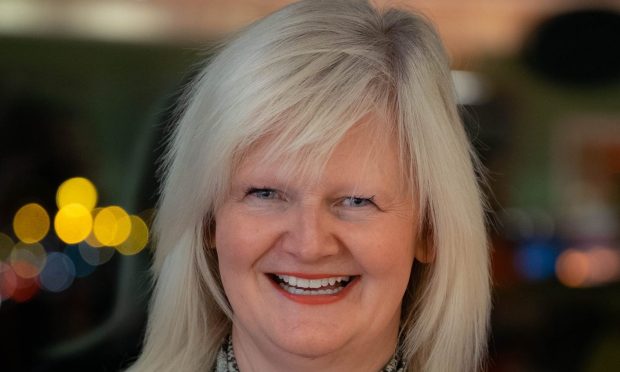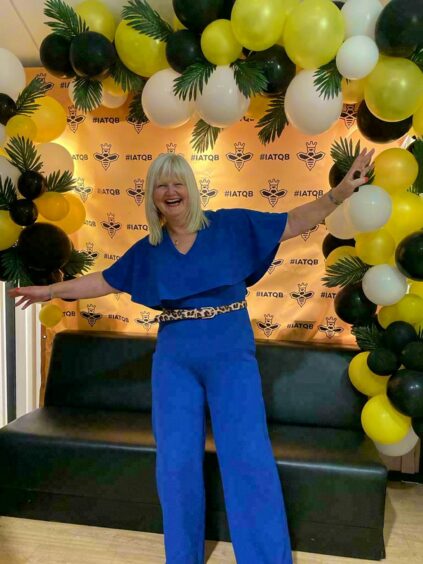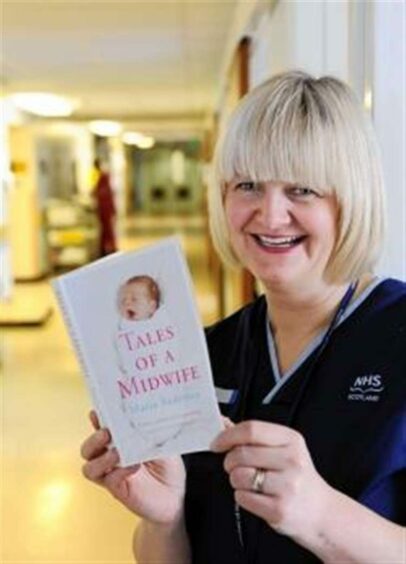With a best-selling book to her name and the media attention that comes with it, Maria Anderson should have been having the time of her life.
Instead, the mum-of-two from the Black Isle had a sudden and crippling crisis of confidence.
It’s only now, through her own research, that Maria, who has been a midwife for the past 35 years, realises that she was experiencing the perimenopause, the period of hormonal change leading up to the menopause.
From anxiety, low self-esteem, brain fog and mood swings to hot flushes and difficulty sleeping, perimenopause symptoms can have a huge impact on relationships, social life, family life and work.
But for Maria, one of the worst side effects she experienced was the deafening silence that surrounds something that millions of women across the world are experiencing.
World Menopause Day
Just three days before World Menopause Day on October 18, Maria, who works at Raigmore Hospital in Inverness, is sharing her story in a bid to start a nationwide conversation about the perimenopause – and the menopause – so that women no longer have to suffer in silence.
“It’s like we’re living with 18th Century generational behaviours and this ‘put up and shut up’ kind of mentality,” says Maria.
“But we live in the 21st century so we need to open up better conversations and start talking more openly about it.
“I’m really passionate about it because I can see women and people struggling around me and they don’t know what to do so it’s about saying you don’t have to put up with this.”
Increasing suicide rates
Maria has every right to be concerned as the devastating impact the perimenopause can have on women’s physical and mental health has been widely reported in the press.
Just last year, the Menopause Experts Group revealed that suicide rates in women of menopausal age have risen by six percent in 20 years while research by Channel 4 and the Fawcett Society shows that one in 10 women have left their their job because of menopause symptoms.
Fighting for women’s health has been a life’s work for Maria who, as a midwife, has brought over a thousand babies safely into the world and has even written a book –Tales of a Midwife – about her experiences on the maternity ward.
Preparing to take early retire from the NHS next month, winding down could not be further from Maria’s mind.
Instead she will turn her attention to raising awareness of the menopause and the perimenopause by organising workshops to support women going through it as well as giving speeches on the subject across communities and supporting employers so they can make little changes that can have a big impact.
“When I wrote Tales of a Midwife, I got a lot of publicity and I was in all of the papers and I did a lot of book signings,” says Maria.
“But I didn’t feel confident inside, I really struggled with it – there were so many different changes and I thought what is going on with me?
“So I then started to do a lot of work and research to try to understand and that’s when I realised it was the perimenopause.”
‘We wear a mask and tell people we’re fine’
Recently, Maria was invited to share her story at an event at Manchester United’s stadium Old Trafford, and was blown away by the positive reaction.
“It was an amazing experience and the feedback I received was incredible,” says Maria.
“Part of my talk was about peeling back the mask on women’s health.
“So I spoke about how, as a society, we’ve been conditioned to wear a mask and not feel able to talk about things because if we talk about the emotional things and how we’re feeling we can be labelled as hysterical.
“Instead we wear a mask and tell people we’re fine, we hide behind these words.
“But by actually opening up these conversations and by supporting women to peel back the mask and actually start talking about how they feel is so important.”
Mentioning the unmentionables
Shocked by the struggle she faced to find support and information on the perimenopause, Maria is determined that no other women should face similar issues.
“I just feel like this is a Cinderella of the services for women’s health and I really want to shine a light on what I can the unmentionables so we can start having better conversations,” says Maria.
In time, Maria, who plans to write a book on the subject, hopes attitudes will change.
“This isn’t just about supporting those experiencing menopause symptoms, it’s about supporting the whole family to understand what is happening so they can support each other through it,” says Maria.
“Instead of it being dreaded, it should be an opportunity for women to start looking after their long-term health.”
Maria’s 7 tips for anyone experiencing menopause symptoms
- You are not alone in how you are feeling.
- Your menopause symptoms are specific to you and are because of a long-term hormone deficiency – you are not going crazy.
- I want people to join the dots going forward not going back during the perimenopause and menopause. The perimenopause can last for 10-20 years.
- What people do now is so important and I want people to know how to access the right support and services so they can live the life they deserve.
- We all need to start talking about ‘the unmentionables’ and stop ‘being fine’.
- HRT can be part of the solution but not the whole solution, lifestyle is more important.
- Your long-term health is important and that is why this generation needs to take action right now so younger generations don’t have to go through what you are going through.
For more information about Maria check out her website www.mariaandersoncoaching.com





Conversation